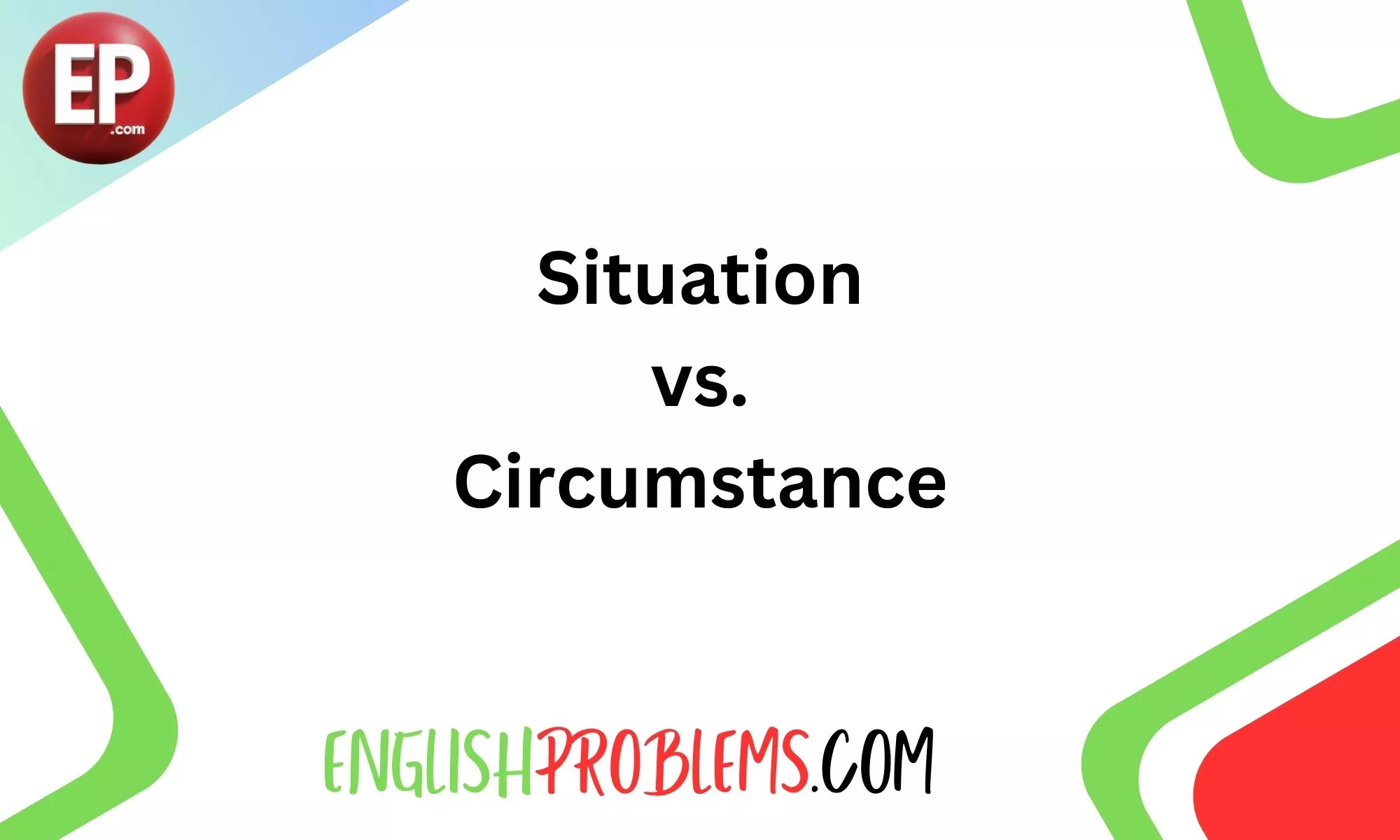Understanding the difference between situation and circumstance is crucial for effective decision-making and personal growth. While these terms are often used interchangeably, they represent distinct concepts that can significantly impact our lives.
This article will explore these differences in-depth, providing definitions, real-life examples, and practical applications to help you navigate both concepts with clarity.
Defining the Terms: Situation vs. Circumstance
Etymology and Dictionary Definitions
Situation and circumstance come from different roots, reflecting their unique meanings.
- Situation: Derived from the Latin word situatio, meaning “a placing or situation.” The term generally refers to the context or set of conditions surrounding a person or event. According to the Merriam-Webster Dictionary, a situation is “a set of conditions or state of affairs.”
- Circumstance: Originates from the Latin circumstantia, meaning “standing around” or “conditions surrounding.” It refers to the external factors or conditions that are not directly controlled by the individual. The dictionary defines a circumstance as “a condition or fact attending an event and having some bearing on it.”
Core Definitions
- Situation: This term refers to the specific context or conditions that someone is dealing with at a particular moment. It often involves elements that can be managed or influenced.
- Circumstance: Refers to external factors that are generally beyond one’s control. These include broader conditions affecting an individual’s life or situation.
Exploring Situations: The Role of Control and Influence
Characteristics of Situations
Situations often involve factors that individuals can control or influence through their decisions and actions. For instance:
- Career Choices: Deciding on a career path is a situation where individuals have significant control. They can influence their professional journey through education, networking, and skill development.
- Project Management: In a work setting, managing a project involves controlling various elements like deadlines, resources, and team dynamics. Effective management of these aspects is crucial for project success.
Influence of Situations
Situations can be influenced by personal choices, actions, and responses. Here are a few examples:
- Success Stories: Many successful entrepreneurs and leaders have shaped their situations through determination and strategic decision-making. For example, Steve Jobs transformed his career by founding Apple and driving innovation.
- Conflict Resolution: How you handle interpersonal conflicts can significantly influence the outcome of the situation. Effective communication and problem-solving skills can lead to positive resolutions.
Outlining Circumstances: Beyond Our Control
Nature of Circumstances
Circumstances encompass factors typically beyond individual control. These external elements can impact one’s life in various ways:
- Natural Disasters: Events like earthquakes or hurricanes are circumstances that individuals cannot control but must adapt to.
- Economic Downturns: Economic conditions can affect job stability and financial well-being, representing circumstances that are largely out of an individual’s control.
Impact of Circumstances
Circumstances often shape life experiences and decisions:
- Health Issues: Chronic illnesses or accidents are circumstances that influence an individual’s lifestyle and choices. For instance, a person with a health condition may need to adjust their career plans or daily activities.
- Global Events: Situations like the COVID-19 pandemic have impacted lives worldwide, creating circumstances that require adaptation and resilience.
Analyzing Examples: Situation vs. Circumstance in Everyday Scenarios
Comparative Analysis
To better understand the difference between situations and circumstances, consider the following examples:
- Job Loss vs. Economic Recession: Losing a job is a situation that individuals can often address through job searching or skill enhancement. In contrast, an economic recession is a broader circumstance affecting many people and industries.
- Personal Finances vs. Inflation: Managing personal finances involves controlling budget and spending habits, while inflation is a circumstance influencing overall purchasing power.
Case Studies
Case Study 1: Career Transition
- Situation: A professional decides to change careers to pursue a passion for teaching. This decision involves managing job applications, training, and networking.
- Circumstance: The broader economic condition of a recession might affect the availability of teaching positions and job security.
Case Study 2: Health Challenges
- Situation: An individual is diagnosed with a chronic illness and must adapt their daily routine and work schedule.
- Circumstance: The availability of healthcare resources and support systems in their region represents a circumstance that impacts their ability to manage the situation effectively.
Psychological Perspectives: How Situations and Circumstances Shape Behavior
The Role of Psychology
Psychology plays a significant role in how we perceive and respond to situations and circumstances:
- Situational Factors: These include the specific context in which decisions are made, influencing behavior and reactions. For instance, a supportive work environment can positively impact job performance and satisfaction.
- Circumstantial Factors: External conditions, such as economic stability or social support, affect overall well-being and coping mechanisms. For example, access to mental health resources can influence how individuals handle stress.
Freud’s Theory and Defense Mechanisms
Sigmund Freud’s theories provide insights into how individuals deal with situations and circumstances:
- Defense Mechanisms: Freud proposed that defense mechanisms, such as denial and repression, help individuals cope with stress and anxiety caused by challenging situations and circumstances.
- Application: Understanding these mechanisms can aid in managing stress and improving resilience in the face of adverse circumstances.
The Impact of Situational Circumstances in Decision Making
Decision-Making Process
Recognizing the difference between situations and circumstances is crucial for effective decision-making:
- Situational Decisions: In situations where you have control, decisions can be based on personal goals and preferences. For example, choosing a new career path involves evaluating personal interests and opportunities.
- Circumstantial Decisions: When facing circumstances beyond your control, decisions may focus on adaptation and coping strategies. For instance, adjusting to a sudden economic downturn may involve financial planning and seeking alternative income sources.
Practical Implications
Effective decision-making involves:
- Assessment: Evaluating the nature of the situation or circumstance.
- Adaptation: Developing strategies to manage situations and cope with circumstances.
- Resilience: Building resilience to navigate challenges and adapt to changing conditions.
Language Nuances: When to Use Situation Over Circumstance
Contextual Usage
Choosing the appropriate term depends on the context:
- Situation: Use when referring to specific conditions or contexts that can be managed or influenced. Example: “The situation at work requires immediate attention.”
- Circumstance: Use for external factors or conditions beyond control. Example: “The circumstance of the economic downturn affected many businesses.”
Common Misconceptions
- Misuse: People often confuse situations with circumstances, leading to misunderstandings. Clarifying the distinction helps in effective communication and problem-solving.
Practical Applications: Applying the Knowledge of Situations and Circumstances
Everyday Applications
Understanding the difference between situations and circumstances can enhance:
- Personal Development: Applying insights to set goals and manage personal growth effectively.
- Professional Success: Leveraging knowledge to navigate workplace challenges and opportunities.
Final Thoughts
Recognizing the distinction between situations and circumstances empowers you to make informed decisions and adapt effectively to various life scenarios. By understanding these concepts, you can better manage your responses and develop strategies for both controllable and uncontrollable factors.

Lucy Wright combines her academic background with a flair for simplifying the intricate details of grammar. Her practical advice and clear explanations empower readers to improve their writing skills and grasp challenging concepts effortlessly.










